Unit 2 Travelling Grammar课件(共32张PPT)
文档属性
| 名称 | Unit 2 Travelling Grammar课件(共32张PPT) |  | |
| 格式 | zip | ||
| 文件大小 | 241.8KB | ||
| 资源类型 | 教案 | ||
| 版本资源 | 牛津译林版 | ||
| 科目 | 英语 | ||
| 更新时间 | 2022-03-06 07:53:56 | ||
图片预览

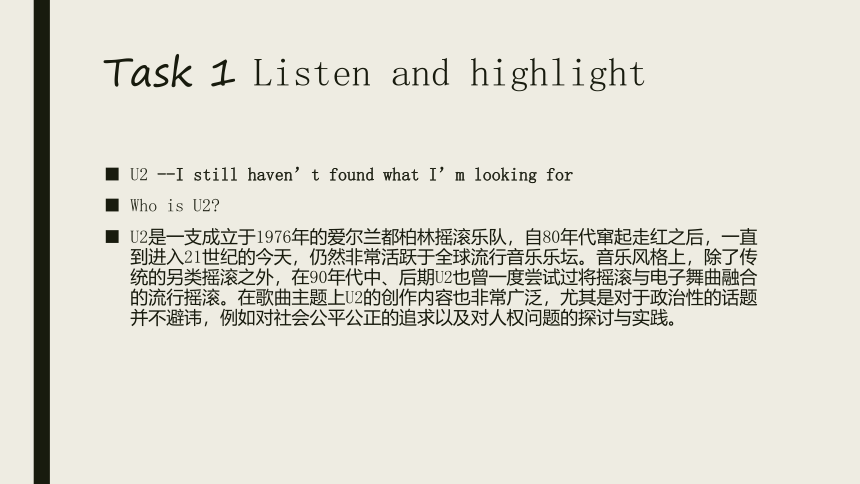
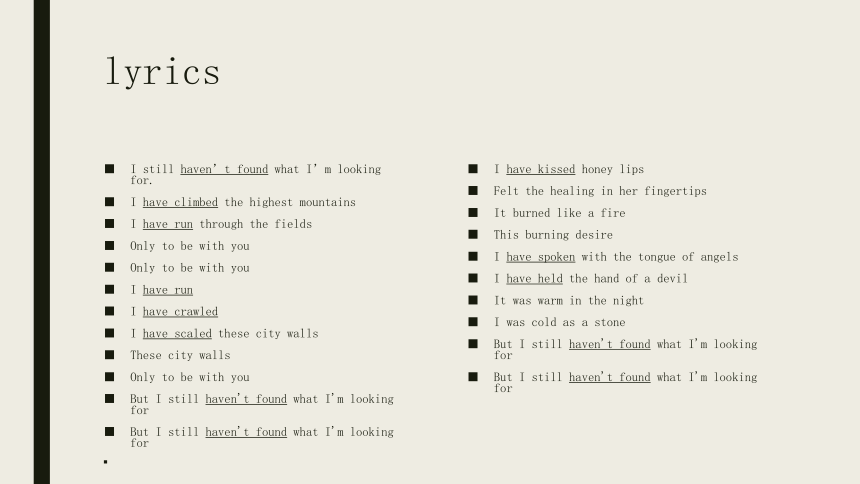
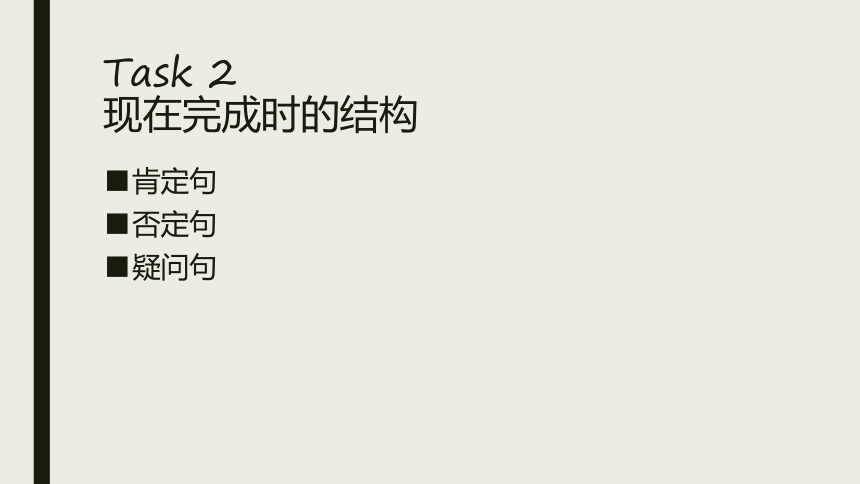
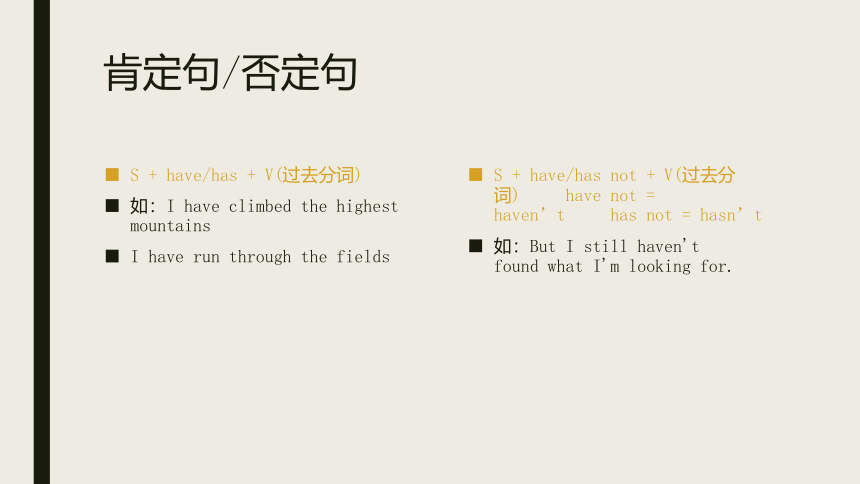

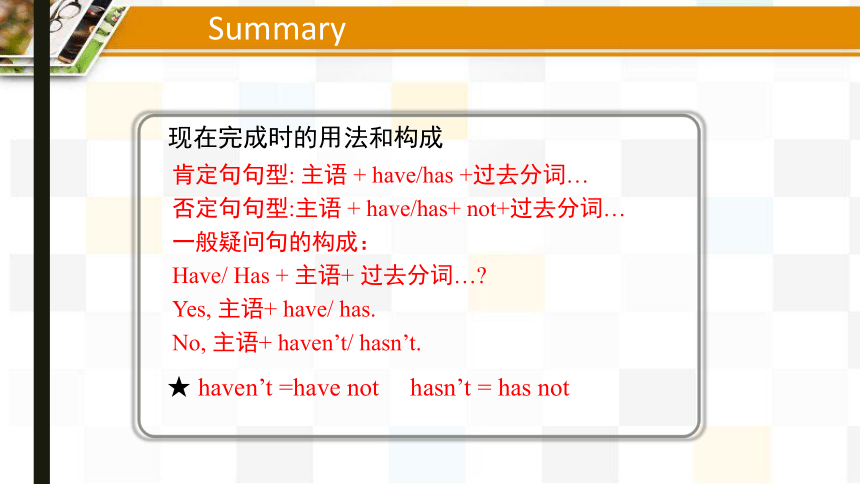
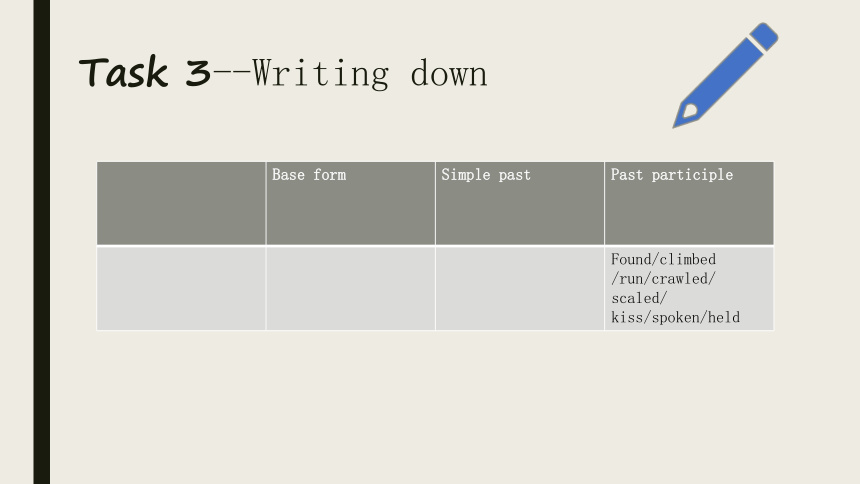
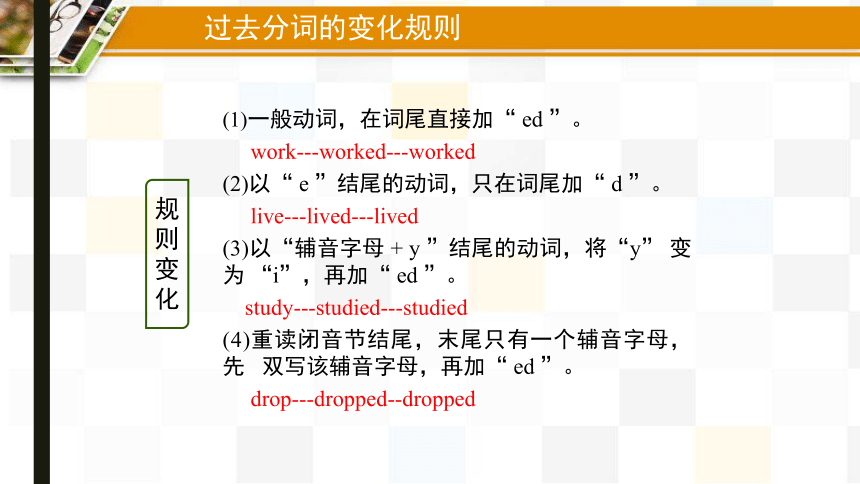
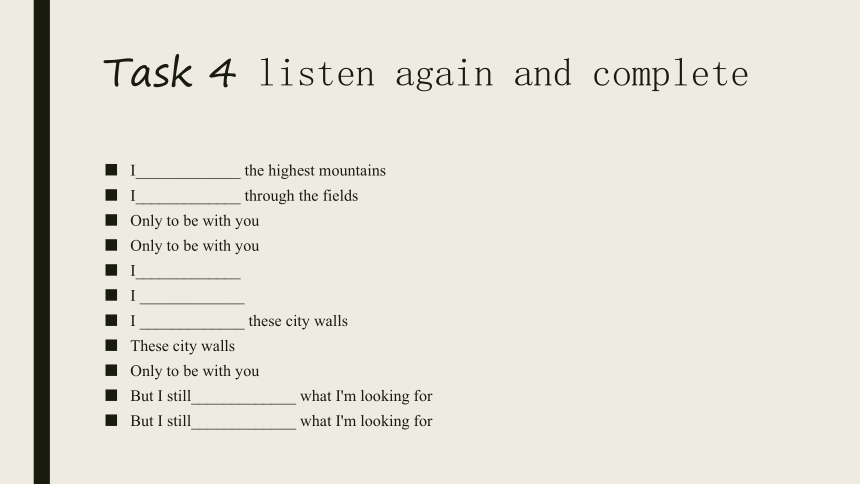

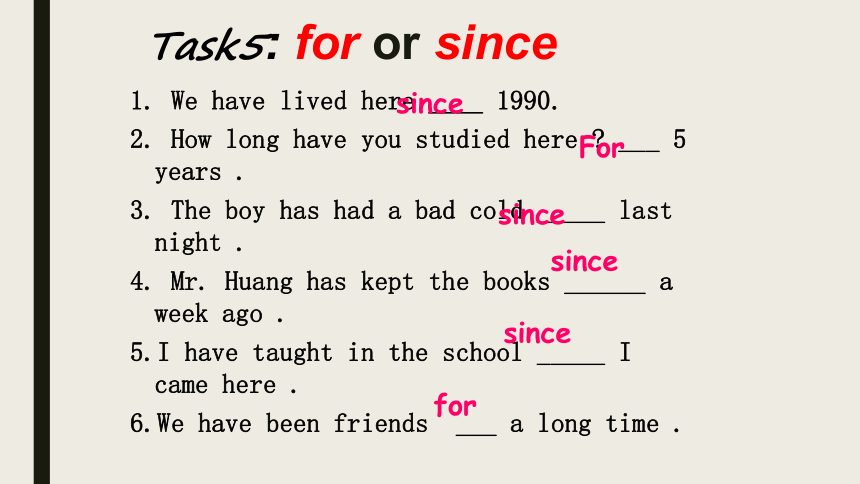
文档简介
(共32张PPT)
unit2-grammar
Present Perfect Tense
Task 1 Listen and highlight
U2 --I still haven’t found what I’m looking for
Who is U2
U2是一支成立于1976年的爱尔兰都柏林摇滚乐队,自80年代窜起走红之后,一直到进入21世纪的今天,仍然非常活跃于全球流行音乐乐坛。音乐风格上,除了传统的另类摇滚之外,在90年代中、后期U2也曾一度尝试过将摇滚与电子舞曲融合的流行摇滚。在歌曲主题上U2的创作内容也非常广泛,尤其是对于政治性的话题并不避讳,例如对社会公平公正的追求以及对人权问题的探讨与实践。
lyrics
I still haven’t found what I’m looking for.
I have climbed the highest mountains
I have run through the fields
Only to be with you
Only to be with you
I have run
I have crawled
I have scaled these city walls
These city walls
Only to be with you
But I still haven't found what I'm looking for
But I still haven't found what I'm looking for
I have kissed honey lips
Felt the healing in her fingertips
It burned like a fire
This burning desire
I have spoken with the tongue of angels
I have held the hand of a devil
It was warm in the night
I was cold as a stone
But I still haven't found what I'm looking for
But I still haven't found what I'm looking for
Task 2
现在完成时的结构
肯定句
否定句
疑问句
肯定句/否定句
S + have/has + V(过去分词)
如:I have climbed the highest mountains
I have run through the fields
S + have/has not + V(过去分词) have not = haven’t has not = hasn’t
如:But I still haven't found what I'm looking for.
疑问句
将have/has 调至S前就可以
Have/Has + S + V(过去分词)?
Q word(疑问词) + have/has + S + V(过去分词)
如:Have you seen my Childhood?
Where have you been
Summary
现在完成时的用法和构成
肯定句句型: 主语 + have/has +过去分词…
否定句句型:主语 + have/has+ not+过去分词…
一般疑问句的构成:
Have/ Has + 主语+ 过去分词…
Yes, 主语+ have/ has.
No, 主语+ haven’t/ hasn’t.
★ haven’t =have not hasn’t = has not
Task 3--Writing down
Base form Simple past Past participle
Found/climbed /run/crawled/ scaled/ kiss/spoken/held
(1)一般动词,在词尾直接加“ ed ”。
work---worked---worked
(2)以“ e ”结尾的动词,只在词尾加“ d ”。
live---lived---lived
(3)以“辅音字母 + y ”结尾的动词,将“y” 变为 “i”,再加“ ed ”。
study---studied---studied
(4)重读闭音节结尾,末尾只有一个辅音字母,先 双写该辅音字母,再加“ ed ”。
drop---dropped--dropped
过去分词的变化规则
规则变化
Task 4 listen again and complete
I_____________ the highest mountains
I_____________ through the fields
Only to be with you
Only to be with you
I_____________
I _____________
I _____________ these city walls
These city walls
Only to be with you
But I still_____________ what I'm looking for
But I still_____________ what I'm looking for
现在完成时定义
过去发生的动作一直延续到现在,有可能继续延续下去 I have lived here since I was born.
我自从出生就一直居住在这里。
过去发生的动作,对现在造成影响 Eddie has eaten my food.
埃迪吃了我的食物。
某个动作迄今为止发生过多少次 I have already read this book many times.
我已经看过这本书很多次了。
Task5: for or since
1. We have lived here ____ 1990.
2. How long have you studied here ___ 5 years .
3. The boy has had a bad cold _____ last night .
4. Mr. Huang has kept the books ______ a week ago .
5.I have taught in the school _____ I came here .
6.We have been friends ___ a long time .
since
For
since
since
since
for
Summary : since and for
Since +a specific point in time
一段时间+ ago
表示过去的某一时间点
从句
Eg: 2021, last may , nine‘o clock
For+ a length of time
表示一段时间的状语
Eg: two months; three years
He has left Beijing for a week.
He has not left Beijing yet.
He has been away from Beijing for a week.
He has bought a car since 2007.
√
√
×
×
He has not bought any new car since 2007.
He has had a car since 2007.
√
√
TASK 6 延续性和非延续性动词
Some verbs, such as come, go, buy and leave, can be used in the present perfect sense, but they cannot be used with for or since in positive statements.
come, go, buy, leave 可以用于现在完成时,
但不能和for或since连用; for 和since和持续
性动词连用,不能和短动作连用
Verb
finish/stop/end
Used for a continuous state
have/has been over
adv. 结束
The parade has been over for hours.
The parade has stopped already.
It stopped hours ago.
Verb
finish/stop/end
Used for a continuous state
have/has been over
adv. 结束
The parade has been over for hours.
The parade has stopped already.
It stopped hours ago.
Verb
come/go/arrive (get to/reach)
Used for a continuous state
have/has been in/at
Kitty has been in Hong Kong for two days.
Kitty has gone to Hong Kong.
She went there two days ago.
Verb
leave
Used for a continuous state
have/has been away
She has been away from home since
last Tuesday.
She has left home.
She left home last Tuesday.
Verb
borrow
Used for a continuous state
have/has kept
She has kept this book since last week.
She borrowed this book last week.
Verb
join
Used for a continuous state have/has been in
have/has been a
member of
Simon has been a member of the Football
Club since last year.
Simon joined the Football Club last year.
Verb
marry/ get married
Used for a continuous state
have/has been married
vi.&vt. 结婚, 嫁, 娶
They have been married for 15 years.
They married 15 years ago.
marry
Verb
die
Used for a continuous state
have/has been dead
adj. 死的
The fish have been dead for some time.
The fish died some time ago.
Task 7: 常见非延续性动词和延续性动词的转变
buy _________
borrow _________
arrive/come/go to _________
become a _________
leave _________
join _________
die _________
open/close _________
get married _________
have
keep
be married
be open/closed
be dead /e/
be in/a member of
be away (from)
be a
be in/at
start/begin __________
stop /finish/ end ___________
catch a cold ___________
get to know ___________
go to sleep ___________
become interested in ___________
get out/ up ___________
fall ill ___________
fall asleep ___________
wake up ___________
be awake
be on
be over
have a cold
know
be asleep/sleep
be interested in
be out/up
be ill
be asleep
Task 8 Telling the differences
Has/have been
Has/have been in
His father has been in Hangzhou for three days.
Where have you been these days
My parents and I have been in Hong Kong for two days
Sandy has never been to South hill. She wants to go with them.
Has /have gone
He has gone to the supermarket. He’ll come back in half an hour.
Kitty and her family have gone to Hong Kong . They will come back next week
Suzy is not at home at the moment. She has gone to the bookshop .
Task 8 Telling the differences
Has/have been
Has/have been in
是一场完成状态的经验;
过去时间点去到某个地点且现在已经回来。
Has /have gone
某人去到某个地点还未返程或者归来。
一、时间
I have met Linda, but I have not met her husband. Have you met him PP is used to talk about past events when there is no specific(具体的) mention of time.
I met Linda yesterday at a party. Her husband was there too, but I did not meet him. Did you meet him at the party SP is used when there is a specific mention of time.
Task 9 现在完成时态(pp)与一般过去时(sp)区别
二 情境不同
Sam has been a math teacher for ten years. He loves teaching. PP is used for situations that began in the past and continue to the present.
Sam was a teacher for ten years, from 2000 to 2010. Now he is an engineer. SP is used for situations that began and ended in the past.
现在完成时态(pp)与一般过去时(sp)区别
1.I ____________ (visit) the Palace Museum with my grandparents the other day(=a few days ago).
2.I ___________(climb) Mount Huang last Summer.
3. __________ you ever __________ (try) the famous Tianjin Baozi
4.I am happy that I___________________(learn) to swim.
5. I _________________ (finish/ just) my homework.
Millie _____________ (finish) her homework 20 minutes ago.
6. I _____________ (write) an email to my friend yesterday.
Daniel _________________(write/ already) two emails.
7. I ____________(be) in Hainan last week.
Some of our classmates _______________ (not be) to Hainan yet.
8. I _____________ (live) in Sunshine Town since I was born.
Daniel _____________ (live) in Nanjing in 2007.
visited
Let’s try! I’m sure you can do it well!
Have
tried
have just finished
finished
wrote
has already written
was
have not been
have lived
lived
climbed
have learned
I ________________ (finish/just) my homework.
Millie _______(finish) her homework 20 minutes ago.
2. I ______ (write) an email to my friend yesterday.
Daniel ________________ (write/already) two emails.
have just finished
finished
wrote
has already written
Please make sentences with the correct tenses.
3. I ____ (be) in Hainan last month. Some of our classmates ____________ (not be) to Hainan yet.
4. I ________(live) in Sunshine Town since I was born.
Daniel ____ (live) in Nanjing in 2007.
was
have not been
have lived
lived
Sum up differences in adverbials of time:时间状语不同
Simple past tense
Present perfect tense
yesterday morning
last month
two years ago
just now
the other day
in 2007
…
already
yet
ever
just
recently
so far
till now
up to now
…
Differences between the simple past tense and the present perfect tense (3)
unit2-grammar
Present Perfect Tense
Task 1 Listen and highlight
U2 --I still haven’t found what I’m looking for
Who is U2
U2是一支成立于1976年的爱尔兰都柏林摇滚乐队,自80年代窜起走红之后,一直到进入21世纪的今天,仍然非常活跃于全球流行音乐乐坛。音乐风格上,除了传统的另类摇滚之外,在90年代中、后期U2也曾一度尝试过将摇滚与电子舞曲融合的流行摇滚。在歌曲主题上U2的创作内容也非常广泛,尤其是对于政治性的话题并不避讳,例如对社会公平公正的追求以及对人权问题的探讨与实践。
lyrics
I still haven’t found what I’m looking for.
I have climbed the highest mountains
I have run through the fields
Only to be with you
Only to be with you
I have run
I have crawled
I have scaled these city walls
These city walls
Only to be with you
But I still haven't found what I'm looking for
But I still haven't found what I'm looking for
I have kissed honey lips
Felt the healing in her fingertips
It burned like a fire
This burning desire
I have spoken with the tongue of angels
I have held the hand of a devil
It was warm in the night
I was cold as a stone
But I still haven't found what I'm looking for
But I still haven't found what I'm looking for
Task 2
现在完成时的结构
肯定句
否定句
疑问句
肯定句/否定句
S + have/has + V(过去分词)
如:I have climbed the highest mountains
I have run through the fields
S + have/has not + V(过去分词) have not = haven’t has not = hasn’t
如:But I still haven't found what I'm looking for.
疑问句
将have/has 调至S前就可以
Have/Has + S + V(过去分词)?
Q word(疑问词) + have/has + S + V(过去分词)
如:Have you seen my Childhood?
Where have you been
Summary
现在完成时的用法和构成
肯定句句型: 主语 + have/has +过去分词…
否定句句型:主语 + have/has+ not+过去分词…
一般疑问句的构成:
Have/ Has + 主语+ 过去分词…
Yes, 主语+ have/ has.
No, 主语+ haven’t/ hasn’t.
★ haven’t =have not hasn’t = has not
Task 3--Writing down
Base form Simple past Past participle
Found/climbed /run/crawled/ scaled/ kiss/spoken/held
(1)一般动词,在词尾直接加“ ed ”。
work---worked---worked
(2)以“ e ”结尾的动词,只在词尾加“ d ”。
live---lived---lived
(3)以“辅音字母 + y ”结尾的动词,将“y” 变为 “i”,再加“ ed ”。
study---studied---studied
(4)重读闭音节结尾,末尾只有一个辅音字母,先 双写该辅音字母,再加“ ed ”。
drop---dropped--dropped
过去分词的变化规则
规则变化
Task 4 listen again and complete
I_____________ the highest mountains
I_____________ through the fields
Only to be with you
Only to be with you
I_____________
I _____________
I _____________ these city walls
These city walls
Only to be with you
But I still_____________ what I'm looking for
But I still_____________ what I'm looking for
现在完成时定义
过去发生的动作一直延续到现在,有可能继续延续下去 I have lived here since I was born.
我自从出生就一直居住在这里。
过去发生的动作,对现在造成影响 Eddie has eaten my food.
埃迪吃了我的食物。
某个动作迄今为止发生过多少次 I have already read this book many times.
我已经看过这本书很多次了。
Task5: for or since
1. We have lived here ____ 1990.
2. How long have you studied here ___ 5 years .
3. The boy has had a bad cold _____ last night .
4. Mr. Huang has kept the books ______ a week ago .
5.I have taught in the school _____ I came here .
6.We have been friends ___ a long time .
since
For
since
since
since
for
Summary : since and for
Since +a specific point in time
一段时间+ ago
表示过去的某一时间点
从句
Eg: 2021, last may , nine‘o clock
For+ a length of time
表示一段时间的状语
Eg: two months; three years
He has left Beijing for a week.
He has not left Beijing yet.
He has been away from Beijing for a week.
He has bought a car since 2007.
√
√
×
×
He has not bought any new car since 2007.
He has had a car since 2007.
√
√
TASK 6 延续性和非延续性动词
Some verbs, such as come, go, buy and leave, can be used in the present perfect sense, but they cannot be used with for or since in positive statements.
come, go, buy, leave 可以用于现在完成时,
但不能和for或since连用; for 和since和持续
性动词连用,不能和短动作连用
Verb
finish/stop/end
Used for a continuous state
have/has been over
adv. 结束
The parade has been over for hours.
The parade has stopped already.
It stopped hours ago.
Verb
finish/stop/end
Used for a continuous state
have/has been over
adv. 结束
The parade has been over for hours.
The parade has stopped already.
It stopped hours ago.
Verb
come/go/arrive (get to/reach)
Used for a continuous state
have/has been in/at
Kitty has been in Hong Kong for two days.
Kitty has gone to Hong Kong.
She went there two days ago.
Verb
leave
Used for a continuous state
have/has been away
She has been away from home since
last Tuesday.
She has left home.
She left home last Tuesday.
Verb
borrow
Used for a continuous state
have/has kept
She has kept this book since last week.
She borrowed this book last week.
Verb
join
Used for a continuous state have/has been in
have/has been a
member of
Simon has been a member of the Football
Club since last year.
Simon joined the Football Club last year.
Verb
marry/ get married
Used for a continuous state
have/has been married
vi.&vt. 结婚, 嫁, 娶
They have been married for 15 years.
They married 15 years ago.
marry
Verb
die
Used for a continuous state
have/has been dead
adj. 死的
The fish have been dead for some time.
The fish died some time ago.
Task 7: 常见非延续性动词和延续性动词的转变
buy _________
borrow _________
arrive/come/go to _________
become a _________
leave _________
join _________
die _________
open/close _________
get married _________
have
keep
be married
be open/closed
be dead /e/
be in/a member of
be away (from)
be a
be in/at
start/begin __________
stop /finish/ end ___________
catch a cold ___________
get to know ___________
go to sleep ___________
become interested in ___________
get out/ up ___________
fall ill ___________
fall asleep ___________
wake up ___________
be awake
be on
be over
have a cold
know
be asleep/sleep
be interested in
be out/up
be ill
be asleep
Task 8 Telling the differences
Has/have been
Has/have been in
His father has been in Hangzhou for three days.
Where have you been these days
My parents and I have been in Hong Kong for two days
Sandy has never been to South hill. She wants to go with them.
Has /have gone
He has gone to the supermarket. He’ll come back in half an hour.
Kitty and her family have gone to Hong Kong . They will come back next week
Suzy is not at home at the moment. She has gone to the bookshop .
Task 8 Telling the differences
Has/have been
Has/have been in
是一场完成状态的经验;
过去时间点去到某个地点且现在已经回来。
Has /have gone
某人去到某个地点还未返程或者归来。
一、时间
I have met Linda, but I have not met her husband. Have you met him PP is used to talk about past events when there is no specific(具体的) mention of time.
I met Linda yesterday at a party. Her husband was there too, but I did not meet him. Did you meet him at the party SP is used when there is a specific mention of time.
Task 9 现在完成时态(pp)与一般过去时(sp)区别
二 情境不同
Sam has been a math teacher for ten years. He loves teaching. PP is used for situations that began in the past and continue to the present.
Sam was a teacher for ten years, from 2000 to 2010. Now he is an engineer. SP is used for situations that began and ended in the past.
现在完成时态(pp)与一般过去时(sp)区别
1.I ____________ (visit) the Palace Museum with my grandparents the other day(=a few days ago).
2.I ___________(climb) Mount Huang last Summer.
3. __________ you ever __________ (try) the famous Tianjin Baozi
4.I am happy that I___________________(learn) to swim.
5. I _________________ (finish/ just) my homework.
Millie _____________ (finish) her homework 20 minutes ago.
6. I _____________ (write) an email to my friend yesterday.
Daniel _________________(write/ already) two emails.
7. I ____________(be) in Hainan last week.
Some of our classmates _______________ (not be) to Hainan yet.
8. I _____________ (live) in Sunshine Town since I was born.
Daniel _____________ (live) in Nanjing in 2007.
visited
Let’s try! I’m sure you can do it well!
Have
tried
have just finished
finished
wrote
has already written
was
have not been
have lived
lived
climbed
have learned
I ________________ (finish/just) my homework.
Millie _______(finish) her homework 20 minutes ago.
2. I ______ (write) an email to my friend yesterday.
Daniel ________________ (write/already) two emails.
have just finished
finished
wrote
has already written
Please make sentences with the correct tenses.
3. I ____ (be) in Hainan last month. Some of our classmates ____________ (not be) to Hainan yet.
4. I ________(live) in Sunshine Town since I was born.
Daniel ____ (live) in Nanjing in 2007.
was
have not been
have lived
lived
Sum up differences in adverbials of time:时间状语不同
Simple past tense
Present perfect tense
yesterday morning
last month
two years ago
just now
the other day
in 2007
…
already
yet
ever
just
recently
so far
till now
up to now
…
Differences between the simple past tense and the present perfect tense (3)
